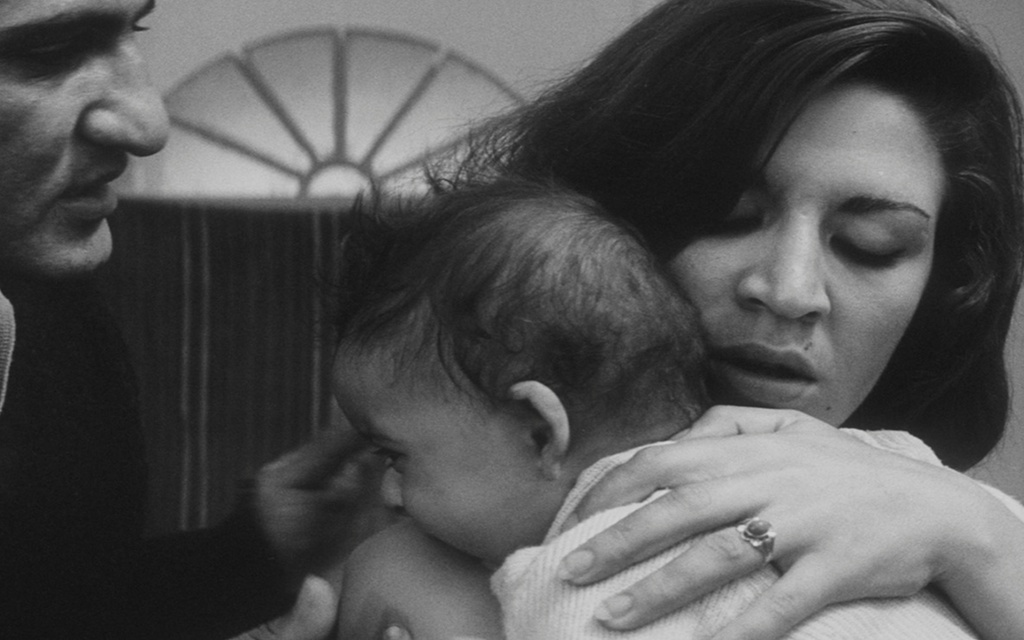|
|
Brick and Mirror | Khesht va Ayeneh (1965)
Synopsis
Golestan has made only two features, Brick and Mirror and The Secret of the Treasure of the Jinn Valley (1972). Only seven years separate them, but they hardly seem the work of the same man.
Jinn Valley, a satirical, allegorical farce about a peasant corrupted by wealth, is interesting for its brassy visual style and what it says about Golestan's escalating rage toward the shah's regime, but it's also bitter, misanthropic, and elitist.
Brick and Mirror, by contrast, is a masterpiece, perfectly focused in its withering portrayal of hypocritical intellectuals preaching altruism.
Cast: Parviz Fannizadeh, Manuchehr Farid, Zakaria Hashemi, Mohammad Ali Keshavarz, Jamshid Mashayekhi, Akbar Meshkin, Jalal Moghadam, Mehri Mehrnia, Taji Ahmadi, Pari Saberi, Ghaffar Hosseinpour, Masoud Faghieh, Goli Bozorgmehr
The film's tragic narrative, taking place over 24 hours and moving from a rapid first half to a slow second, shows us a Tehran radically different from anything we've seen in the second Iranian New Wave -- especially in an early nightclub scene featuring a woman dancing onstage, at least one gay audience member, and a lot of bohemian atmosphere.
What's deceptive about the film is that it combines a neorealistic look (in black and white and 'Scope) with visual and dramatic modes that suggest expressionism and metaphysics.

Peripheral characters periodically take over the story, and some of their monologues suggest Dostoyevsky in recounting the world's misery. (The title derives from a somewhat cryptic line by the 13th-century Persian poet Sa'adi that says what the old can see in a mud brick, youth can see in a mirror.)
The film opens at night with a cabdriver named Hashemi (Zackaria Hashemi) listening to a man on the radio read a story set in a nocturnal forest. (The voice is Golestan, recognizable from his prosaic portion of the narration in The House Is Black.)
Hashemi picks up a woman (Farrokhzad, seen only obliquely in a cameo) who directs him to a dirt road on a hillside. After dropping her off, he discovers she's left a baby girl in the backseat.
Clutching the baby, he runs after the woman and suddenly finds himself at the head of a steep stairway descending into darkness. Three rapid jump cuts moving down the steps and away from him emphasize his paralysis and isolation.
_02.jpg)
He eventually winds up at a huge construction site, no less theatrically lit, speaking to a homeless woman in a scene that in its ambience briefly recalls Orson Welles's LThe Trial.
We move next to a noisy nightclub where Hashemi, baby in tow, explains his dilemma to a group of flippant, dandyish friends and acquaintances as well as to his girlfriend, Taji (Taji Ahmadi).
Later, at a police station, he's advised to take the baby to an orphanage if no one claims her by morning. Taji meets Hashemi there and insists on returning with him to his one-room flat, where they spend an uneasy night: he's paranoid that the neighbors will jump to conclusions about his sex life, she's anxiously hopeful that they'll keep the baby and get married.
The film's emotional climax occurs the next morning, with Taji alone in the orphanage. It's an extraordinary sequence, alternating documentary footage of orphans looking at the camera with Taji's playful and compassionate responses to them, and culminating with a powerful tracking shot that moves down an endless corridor away from her.
Formally it's a precise complement to the earlier jump cuts, as slow and meditative as those were rapid and breathless, each locating a protagonist in a wider world that's metaphysical as well as physical, standing on the brink of inconsolable grief. (Jonathan Rosenbaum, May 4, 2007)
|
.jpg)
Read about this film
Title: Brick and Mirror | Khesht va Ayeneh (1965)
Directed by: Ebrahim Golestan
Date of birth: 19 October 1922, Shiraz, Iran
Date of death: 22 August 2023, Sussex, United Kingdom
Writing credits:
Ebrahim Golestan
Music by: Jalal Rameshi (Tar player)
Country: Iran
Language: Farsi
Color: Black and White
Runtime: 131 min.
|
|
| Choose an item to go there!
|
|

